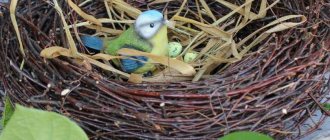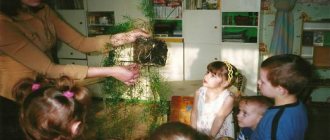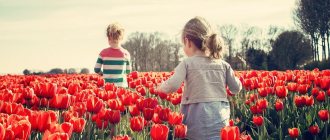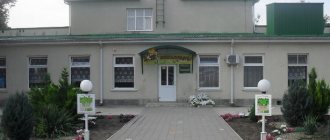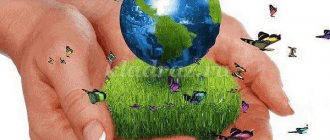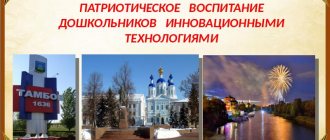Senior group. Senior preschool age. Children 5-6 years old
Project for senior preschool children “Let’s save the nature of the Lipetsk region” PROJECT on the topic : “LET’S SAVE THE NATURE OF THE LIPETSK REGION ”
Type
of project : educational and creative Duration: one week Project : children of senior preschool age, parents, teachers.
Relevance of the topic. Children have insufficient understanding of caring for... Project for children of the senior group “By sorting waste, we save nature!” Description of the material: I offer you a methodological development “Implementation of the educational and research project “Sorting waste - saving nature ” for children of the older group (5-6 years old. This material will be useful not only to teachers of preschool educational organizations, but also...
Environmental project “We don’t need garbage - we are friends with nature”
Project passport
| Subject | "Clean Land" |
| View | Creative, practice-oriented, long-term |
| Author-developer | Teacher Zueva A.O. |
| Project participants | Teacher, children 6-7 years old, parents (legal representatives) |
| Target | Creating conditions to attract the attention of children and their parents to the problems of pollution in their native land. |
| Tasks |
|
| Expected results | The level of environmental awareness of children and their parents has been increased. Project participants demonstrate a responsible and humane attitude towards the environment and their native land. Cognitive activity and research skills have been developed. The level of knowledge about recycling and recycling of waste has increased. Parents of pupils are actively involved in joint activities with the kindergarten. |
| Regulatory framework | — Constitution of the Russian Federation; — Federal Law of December 29, 2012 No. 273-FZ “On Education in the Russian Federation”; — Order of the Ministry of Education and Science of Russia dated October 17, 2013 No. 1155 “On approval of the federal state educational standard for preschool education”; — Resolution of the Chief State Sanitary Doctor of the Russian Federation dated May 15, 2013 No. 26 “On approval of SanPiN” — Letter of the Ministry of Education of Russia dated May 17, 1995 No. 61/19-12 “On psychological and pedagogical requirements for games and toys in modern conditions” |
| Educational and methodological support | 1. Anichev K.V. Problems of the environment, energy and natural resources. – M.: “Progress”. - 1974. 2. Berlyant A. M. New schoolchild encyclopedia. Earth.- M.: “Rosman” - 2003 3. Gorkova L.G., Kochergina A.V., Obukhova L.A. Scenarios for classes on environmental education for preschoolers. M.: “Vako”, 2007. 4. Kondratyeva N.N. "We". Children's environmental education program, 2004. 5. Makhaneva M.D. Ecological development of children of preschool and primary school age. M.: Arkti, 2004. 6. Novikov Yu.V. Nature and Man, M.: “Enlightenment”, 1991. Voronkevich O.A. Welcome to ecology! St. Petersburg “Childhood-Press”, 2003. |
Relevance
It’s not clean where they clean,
and where they don’t litter.
Environmental education of preschoolers is the development in children of the ability to understand and love the world around them and treat it with care. The tense environmental situation around the globe requires that environmental education and training at all levels form students’ ideas about the world around them as an environment with obvious limits of resources and capabilities.
Interest in environmental issues is not accidental. It is due to the environmental crisis that worries humanity and its consequences, as well as the search for new ways out of it. Pollution of our environment is a major problem of our time. At the moment, a lot is known about it - a large number of scientific papers and books have been written, numerous studies have been conducted. But humanity has made very little progress in solving the problem. Pollution of nature still remains an important and pressing issue, the postponement of which can turn tragic.
It is from preschool age that it is necessary to instill in children the idea that a person needs an ecologically clean environment.
Classification of nature pollution
There are several classifications of natural pollution based on their source, direction, and other factors. So, the following types of environmental pollution are distinguished:
- Biological pollution – the source of pollution is living organisms, it can occur due to natural causes or as a result of anthropogenic activities.
- Physical pollution – leads to changes in the corresponding characteristics of the environment. Physical pollution includes thermal, radiation, noise and others.
- Chemical pollution is an increase in the content of substances or their penetration into the environment. Leads to a change in the normal chemical composition of resources.
- Mechanical pollution – pollution of the biosphere with garbage.
In reality, one type of pollution may be accompanied by another or several at once.
Garbage left on the ground harms more than just the soil. Its vapors enter the atmosphere, and the wind carries it to the water. Much of the ecological world suffers in this way.
To avoid environmental disaster, combating physical pollution must be a top priority. The problem must be solved at the international level, because nature has no state borders. To prevent pollution, it is necessary to impose sanctions on enterprises that discharge waste into the environment, and impose large fines for placing waste in the wrong place. Incentives to comply with environmental safety standards can also be achieved through financial methods. This approach has proven effective in some countries.
How can we fight the pollution of our native land within the framework of a kindergarten? In order to draw attention to the problem of pollution, it is necessary to carry out educational work with children, explain to them what harm various pollution causes to nature, and what needs to be done to reduce this harm.
Therefore, it was decided to draw up detailed long-term planning of work that will encourage young residents and their families to preserve the environment.
Forms of working with children:
— group (frontal);
— subgroup (small interest groups);
- individual.
Methods and techniques:
— visual (viewing illustrations, photos, presentations and educational educational films, virtual excursions to waste processing plants);
- verbal (conversation, story, reading fiction);
— gaming;
— practical (labor activity, artistic creativity).
Work principles:
- The principle of interconnection of all areas of work with preschoolers (integration).
- Systematic principle. Classes are conducted systematically, with mandatory reinforcement in independent activities.
- The principle of a person-centered approach.
- The principle of visibility. All submitted material is accompanied by the display of illustrations, viewing of presentations and videos.
- The principle of accessibility. Educational material is presented in a format understandable for preschoolers, all game materials on the topic being studied are within easy reach, at the children’s eye level.
Creation of RPPS for environmental education of children
The environmental corner of the group includes the following components:
— educational and visual aids (educational videos and cartoons, collections, models, paintings, panels, layouts, diramms);
- literary works (stories, poems, proverbs, riddles, fairy tales);
— games (didactic, object-based, board-printed, role-playing, verbal, active, creative);
The main feature of the ecological corner is the systematic filling with the results of children's activities: creative works, photo reports, albums, newspapers, crafts from recycled materials, etc.
The corner also contains a shelf for experimentation, which includes a card index of experiments for children and equipment for experimental activities. Experimental activities, as a form of work with children, contribute to the activation of the cognitive sphere of preschoolers.
In the theater corner, various masks (animals, insects, vegetables and fruits) and costumes are selected for acting out environmental fairy tales and dramatization games that contribute to the cognitive, environmental and aesthetic development of children, and the formation of their moral qualities.
No less important for environmental education is the developmental environment and group walking area, in the creation of which parents of pupils take an active part.
Project implementation stages
Stage 1 – preparatory:
- Studying the regulatory framework and methodological literature for the project.
- Defining the goals and objectives of the project.
- Studying literature on the topic.
- Selection of methodological literature.
- Discussion of the issue and questioning at the parent meeting.
- Preparation of a developmental environment (didactic and board games, card files of thematic physical exercises, experiments; selection of illustrations, fairy tales, magazines, encyclopedias)
- Development of a training system.
- Selection of literary works on the topic (poems, proverbs, sayings, riddles, fairy tales).
- Preparation of educational presentations, interactive games, cartoons on the topic of the project.
Stage 2 – main:
- Conducting educational sessions and conversations on the topic of the project;
- Reading educational literature, encyclopedias;
- Work to develop in children a caring attitude towards natural objects of their native land.
- Labor activity on the territory of the kindergarten and in nearby public gardens.
- Environmental actions.
- Development of original didactic games and manuals.
- Involvement of parents of students.
Stage 3 – final:
- Exhibition of children's creative works.
- Ecological holiday “We are friends with order.”
- Presentation of work results at a parent meeting, presentation of thanks to active participants in project activities.
- Speech at the final pedagogical council with the results of work on the project topic (presentation).
Long-term planning of work with children and parents of pupils
| Cognitive activity | Practical activities | Play activity | Reading fiction | ICT | Working with parents |
| June | |||||
| OOD “What do we know about environmental pollution” Conversation “Rules of behavior in nature” | Drawing prohibition environmental signs | D/i “Ecological Train” P/i “What will we collect in the bucket” S/r game “Forester” | Fairy tale “The Bunny and the Little Bear” by N.A. Ryzhova | Cartoon “Crocodile Gena and Cheburashka. Cleaning the river from garbage" | Community work day on the walking area with the creation of decor and game modules from rubber tires and plastic bottles |
| July | |||||
| OOD "Garbage undoubtedly requires division" | Modeling “Vase” from glass bottles using cereals | D/i "Garbage sorting" S/r game "At the factory" | The fairy tale “About the Khlamishche-Damned” | “Virtual excursion to a waste processing plant” | Folder “Second Life of Garbage” |
| August | |||||
| OOD "Green City" Research activity "Properties of plastic" | Dresses for dolls made from plastic bags, used balloons, and foil. | D/i “Tops-Roots” S/r game “Team of Nature Rescuers” | Fairy tale “No place for garbage” | Presentation “How a forester takes care of the forest” | Master class “Crafts from plastic dishes” |
| September | |||||
| OOD "Garbage sorting" TRIZ "How much garbage does a kindergarten throw out" | Collective work “Car Park” - toys made from plastic cups and matchboxes. | D/i “What’s extra” S/r game “We’re going on a hike” | Fairy tale “About Garbage Mud” | Presentation “The History of the Appearance of Garbage on Earth” | Active participation in waste paper collection |
| October | |||||
| OOD "Paper Properties" Creation of the "Green Patrol" team | Creation of the calendar “Our environmental affairs” | D/i “Yes - no” P/i “Bird without a nest” | "The Story of the Orange Garbage Truck" | Video “How paper is created” | Consultation “Environmental education of preschool children” |
| November | |||||
| OOD "Science of Glass" TRIZ "What happens if you bury garbage in the ground..." | Craft “Wall Clock” from plastic dishes. | Lotto “Time of Year” D/i “Sort out the trash” | The fairy tale “Masha and the Bear” by N.A. Ryzhova | Presentation “Red Book of the Moscow Region” | Drawing propaganda posters and wall newspapers |
| December | |||||
| OOD "Ecological professions" Research work "Paper recycling" | Collective drawing of a poster “We are given one for all – the fragile planet Earth” | D/i “What harms nature” S/r game “Trip to the sea”, plot “Cleaning up trash after ourselves” | "The Tale of the Battery" | Cartoon "Robocar Poli - Fuss around garbage" | Active participation in collecting batteries. Consultation “Raising a child begins with yourself” |
| January | |||||
| OOD "Smeshariki restore order" | Crafts "Feeders" from plastic bottles" | D/i “Field of unnecessary items” | “Why does the Earth have a green dress” by A. Lopatin | "Your Friend Bobby - Recycling" | Booklet “Waste Disposal Ways” |
| February | |||||
| OOD "Clean Water - Healthy Earth" TRIZ "How a person can save nature" | Crafts “Flower Pots” from plastic bottles. | Board game “Sorting into bins” S/r game “Park ecologist” | “A Mighty Blade of Grass” by M. Skrebtsov | Educational program “Galileo – About garbage” (excerpt) | Help in creating a winter town on the playground and clearing walking areas |
| March | |||||
| OOD "Hazardous waste" Quiz "Garbage is the enemy of nature" | Collective collage “March 21 – forest day, March 22 – water day” using foil, cotton wool, gouache. | D/i “Sort the garbage into the correct containers” | Fairy tale "The story of one drop" | Presentation film “Where does the garbage go” | Participation of parents in the campaign “Tree planting”, “Electronics recycling” |
| April | |||||
| OOD "Combustion of Various Materials" Event "Earth Day" | “Seedling pots” made from toilet paper rolls | Ecological crossword puzzle S/r game “Greeners” | Fairy tale “Second Life” by K.N. Lysova | Cartoon “Your Friend Bobby – Recycling Garbage” | Environmental campaign “Clean Land” - cleaning the Olgino microdistrict |
| May | |||||
| The final event is the environmental holiday “We are friends with order” | Collective production of a lapbook “Take care of nature” | D/i “Let’s clear the lake of garbage” Cut-out pictures “Planet Earth” | Fairy tale “No Place for Garbage” by A. Krivoshchekov | Interactive game “Clean Planet” | Parent meeting “Results of work on the implementation of the environmental project” (presentation of thanks) |
Literature
1. Gomarovich E.S. "What the city breathes." M.: Chemistry, 1990.
2. Zakhlebny A.N. “Book for reading on nature conservation” M.: Prosveshchenie, 1986.
3. Complex classes edited by Vasilyeva M.A., Gerbova V.V., Komarova T.S. - Volgograd Teacher 2012
4. Konopleva N.P. “The Second Life of Things”, Moscow: Education, 1993.
5. Nikolaeva S. N. “Young ecologist.” Environmental education program in kindergarten.
6. Protasov V.F. “Ecology, health and environmental protection in Russia”, M.: Finance and Statistics, 2001.
7. Rodionov S.K. etc. “What is garbage.” M.: Chemistry, 1991.
8. Solomennikova O.A. Environmental education in kindergarten - M.: Mozaika-Sintez, 2010.
9. Hoefling G. “Anxiety in 2000.” M.: Mysl, 1990.
10. Khotuntsev Yu. L. “Man, technology, environment.” M.: Sustainable World, 2001.
Interactive Resources
“A nursery rhyme about garbage” https://www.youtube.com/watch?v=wTcskGadMws
“Ask Albert”, series “Garbage and waste like a boomerang” https://www.youtube.com/watch?v=af4e1uzmjic
“About garbage” https://www.youtube.com/watch?v=hV2RLGHyZDk
"Your Friend Bobby" Episode 27 "Recycling"
“Robocar”, episode 41 “Vanity around garbage” https://www.youtube.com/watch?v=YUPmp8Eor6U
“Fixies” Series: “Paper”, “Ecotester”, “Batteries”, “What ecology teaches”, “Not trash at all” https://www.youtube.com/watch?v=1mCOnXHO0TE
“Where does the garbage go” https://www.youtube.com/watch?v=X9Fw28RlG7U
